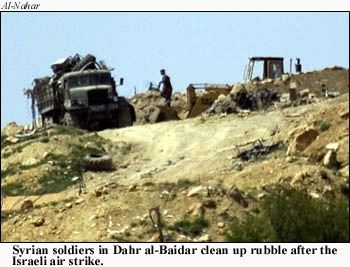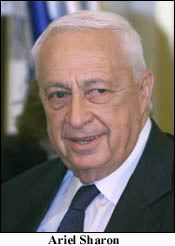 |
| Vol. 3 No. 4 | Table of Contents MEIB Main Page | April 2001 |
 |
By decisively ending Syria's ability to sponsor attacks against Israeli forces from south Lebanon without suffering consequences, Israel's new retaliation policy deprives Damascus of a relatively cost-free means of pressuring the Israelis to make concessions at the negotiating table.
Moreover, Israel's decision to abandon its previous policy of retaliating only against Lebanese economic and civilian targets and instead directly target Syrian military forces will severely inhibit efforts by Damascus to divert public attention in Lebanon from the 35,000 Syrian troops stationed in the country. Since the withdrawal of Israeli forces in May 2000, Hezbollah attacks have been carefully timed to occur shortly after manifestations of Lebanese public opposition to the Syrian presence.
Out with the Old
After the departure of Israeli forces from south Lebanon in May 2000, the UN declared that Israel had fulfilled its obligations under UN Security Council Resolution 425, which called for an Israeli withdrawal from the country in 1978. However, Syria and its client regime in Lebanon began claiming that a small section of the Golan Heights occupied by Israel during the 1967 Six Day War was, in fact, Lebanese not Syrian. Nevertheless, UN officials maintained that the disputed territory should be addressed within the context of negotiations between Israel and Syria and other applicable Security Council resolutions (242 and 338)
Under Syrian pressure, the Lebanese government refused to disarm Hezbollah guerrillas or deploy its 75,000-strong army in south Lebanon. Last fall, Hezbollah resumed periodic operations limited to the Shebaa Farms area.
Although Israeli officials had routinely condemned Syrian sponsorship of Hezbollah operations, clear and explicit threats to retaliate directly against Syrian forces were first made in the aftermath of a February 16 Hezbollah attack on an IDF border patrol, which killed one soldier and injured two.
By this time, the pattern of attacks had made it abundantly clear that Syria was authorizing Hezbollah attacks primarily to counter opposition to its authority within Lebanon. Previous Hezbollah attacks on November 16 and November 26 occurred just days after major anti-Syrian demonstrations took place in Lebanon. The February 16 attack came four days after a Lebanese television station broadcast an interview with the country's leading opposition figure in exile, Michel Aoun (the authorities quickly forced the station to publicly disavow Aoun's views). However, the increasingly negative reaction to Hezbollah operations in the Lebanese press (in stark contrast to public sentiments before Israel withdrew from south Lebanon) indicated that Syria's diversionary strategy was not working.
Ten days later, Israeli officials served notice that Syria's continued sponsorship of paramilitary attacks against Israelis would henceforth be met with direct retaliation against Syrian forces in Lebanon. "Bashar Assad is playing with fire. I am not sure we will be able to restrain ourselves for long over Hezbollah attacks on Israel . . . Syria is responsible for these actions," Israeli Chief of Staff Shaul Mofaz told visiting American Secretary of State Colin Powell during his visit to Israel in late February. "We will put an end to the Syrian paradise in Lebanon," said an unidentified security official quoted in the Israeli press. "From now on, when there is fire, it will first and foremost burn the Syrians and their interests. They will be held accountable."1
This warning was not considered credible in Damascus for a number of reasons. First, Israel had not retaliated against Syrian forces in Lebanon in nearly twenty years. Although Israeli helicopters attacked a Syrian position around Beirut airport during the 1996 Grapes of Wrath campaign, this was not an intentional strike against the Syrian military - Israeli military sources later said the pilots thought it was a Lebanese army outpost. Second, it is well-known that American officials have strenuously opposed Israeli attacks on Syrian targets in Lebanon, believing that direct military confrontations between the two sides would dissuade the Syrians from reopening bilateral negotiations. Sharon is the first Israeli prime minister willing to dispense with the diplomatic "red lines" drawn by successive American administrations.
Sharon's Power Play
On April 14, an Israeli soldier was killed when Hezbollah guerrillas hit an Israeli tank in the disputed Shebaa Farms area with Sagger missile. As with previous attacks, the Hezbollah operation came amid an intensification of overt opposition to Syrian hegemony within Lebanon, particularly among Muslims.2
International reaction to the Hezbollah attack was decidedly negative. UN officials quickly declared that the operation violated the UN-demarcated line between Lebanon and Israel. As usual, several Lebanese newspapers delicately criticized the attack. Al-Mustaqbal, a paper owned by Prime Minister Rafiq Hariri, who has quietly pressed Syria to end the attacks, rhetorically asked: "Could Lebanon, under the circumstances it faces nowadays, bear the consequences of such an operation and its political, economic and social impacts?"3
On the night of April 15, the Israeli cabinet met and approved (by a vote of 11-2) Sharon's proposal to retaliated directly against Syria. Shortly after midnight, four Israeli aircraft fired six missiles on a Syrian radar station in the mountainous Dahr al-Baidar region, where Syrian forces maintain numerous bases and air defense installations. The area, which has an altitude of over 6,000 feet, is considered strategically important because it overlooks most of Lebanon, from its Mediterranean coast in the West to the eastern Beqaa Valley, and is a major pass through the mountains of the Beirut-Damascus highway.
Although witnesses reported seeing "blind" tracer fire from Syrian anti-aircraft guns immediately after the attack, it was evident that the Israeli warplanes struck into the heart of the country without being detected. The radar station was completely destroyed.
Lebanese President Emile Lahoud called Assad shortly after the raid to express his condolences and then released a statement condemning the attack as "manifestation of the bloody policies Ariel Sharon has followed since he came to power against the Palestinians and the Lebanese." The statement added that the three Syrian soldiers killed in the raid "joined the long list of the martyrs of the Lebanese army and the resistance." Prime Minister Hariri denounced the air strike as a "grave act of aggression."
 |
While Foreign Minister Shimon Peres reportedly opposed the strike during cabinet deliberations on April 15, most Israeli political figures supported the operation after the fact. Even Labor MK Yossi Beilin, an architect of the Oslo Accords and early advocate of an Israeli withdrawal from south Lebanon, said afterwards that the attack was fully justified.
However, US reaction was decidedly less supportive than has been the case with previous retaliations against Lebanese targets, reflecting fears that this new retaliatory policy will complicate the Bush administration's efforts to obtain Syrian backing for its proposed "smart sanctions" against Iraq. "It's the first time in 10 years against a military installation," said Assistant Secretary of State for Near Eastern Affairs, "so it's a very disturbing and dangerous escalation. We would like to see calm on that border."
US State Department spokesman Ari Fleischer said that Bush and Assad "had agreed on the urgent need to restore calm to the area and all parties need to use their influence to avoid further escalation of violence and they both agreed on the need for all parties to use restraint." However, Syria's official news agency gave a substantially different account of the conversation. "We reserve the right to protect our rights and our dignity, and we reserve the right to respond in the manner that we feel is appropriate," Assad was quoted as telling Bush, adding that "repeated calls for self-restraint are no longer of any avail."4
Syria's Options
Notwithstanding such rhetoric, Assad can do little to change the new rules of the game laid down by Israel. A continuation of Hezbollah attacks against Israeli soldiers in the Shebaa Farms area will probably lead to similar Israeli reprisals against Syrian forces in Lebanon. This is not an attractive option for Assad so long as Syria -and Syria alone - bears the consequences. As one analyst observed in Beirut's Daily Star, Syria would be "compelled to limit its responses to the Shebaa Farms, while Israel has the latitude to respond against Syrian forces anywhere in Lebanon."5
Moreover, the prospect of Israeli planes repeatedly penetrating Syrian air defenses in Lebanon, to hit Syrian targets, in response to attacks authorized by Syrian officials is not likely to galvanize Lebanese public opinion against Israel.
The only other option is very risky - escalating the conflict by authorizing Hezbollah to launch Katyusha rockets into northern Israel in hopes that this will provoke the Israelis into launching air strikes or a ground incursion against Hezbollah. Either would almost certainly lead to Lebanese civilian casualties, which will then be exploited by Damascus for propaganda purposes. After the April 1996 Qana massacre, in which 107 civilian refugees were killed by Israeli artillery fire, the Syrians constructed a macabre museum to display horrific pictures of the dead and wounded.
However, Israeli officials have since come to recognize that there is no viable way of combating guerrillas who intentionally endanger the lives of "friendly" civilians by firing mortar or rocket attacks from densely-populated areas. Assad knows that an escalation will most likely result in fierce Israeli reprisals against Syrian forces in Lebanon, or perhaps even against targets in Syria itself.
It is noteworthy that Sharon did not order residents of northern Israel to into bomb shelters before or after the Israeli attack - a virtually routine measure in the past whenever heavy air strikes into Lebanon took place. It was as if Sharon was saying to Assad: "You know what will happen if Katyushas fall on northern Israel, I know that you know what will happen, and you know that I know that you know."
Notes
1 Ma'ariv, 26 February 2001.
2 Middle East Intelligence Bulletin, April 2001.
3 Al-Mustaqbal (Beirut), 15 April 2001.
4 Al-Safir (Beirut), 20 April 2001.
5 The Daily Star (Beirut), 21 April 2001.